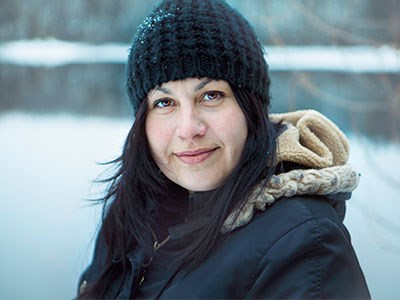Growing up in the remote community of Eabametoong First Nation, Rachel Mishenene never placed any great emphasis on getting an education, much less pursuing a career.
“I was a high school dropout and a young mom,” said the Thunder Bay-based Aboriginal educator and consultant. “Education was something I had no interest in going into or being a part of.”
It was only when her infant son – now 20 years old – turned the age of two did reality finally sink in.
“I needed a better life for myself and for him, and the only way was to go back and get my Grade 12 equivalency.”
Enrolling in Confederation College's Aboriginal Law and Advocacy program turned out to be a life-changing experience. “It really was an eye-opener.”
Today, her resumé includes a masters of education, bachelors of education and art, and she is a PhD student focusing her research on parental engagement in First Nation communities.
Her passion for teaching Aboriginal history and perspectives has been spun out into a fledgling business – Rachel A. Missenene Consulting Curriculum Development and Education – which won Nishnawbe Aski Development Fund's New Business of the Year Award last October.
Beginning as an elementary school teacher in 2003, Mishenene taught in Dryden and at Dennis Franklin Cromarty, a Thunder Bay Aboriginal high school, before she took on the task to develop curriculum for the Urban Aboriginal Education Project with the Lakehead District School Board.
The board was one of three to receive a $1-million grant from the Ministry of Education for a kind of cultural diversity program to inject Aboriginal content and perspectives into the curriculum to meet the board's literacy goals.
“I took whatever they had on paper and made it reality,” said Mishenene.
She developed a six-day teaching module for a Grade 10 civics course outlining the diversity of First Nation, Metis and Inuit people across Canada; their history, treaties, the Indian Act and the impact of residential schools.
She visited classrooms, hosted teachers' workshops and established the First Peoples' Resource Collection, a selection of books written by Aboriginal authors or containing Native content and perspectives.
The pull to go into consulting was spawned from her decision to leave the school board to pursue her master's of education degree.
“I still needed to create an income for myself and what better way to do that than to find work that I enjoy doing and that I'm passionate about. Things just fell into place.”
More encouragement to go into business for herself came from her mentor, Murray Waboose, the education department manager with the Matawa First Nations, with whom she was developing a GED (General Education Development) program.
Today, she reviews and creates a range of course material, curriculum, teaching kits and co-authors textbooks for clients like Negahneewin College, Confederation College, Elementary Teachers' Federation of Ontario, Ontario Teachers' Federation, Ningwakwe Learning Press and McGraw-Hill Ryerson.
As a prominent Thunder Bay activist in gay-lesbian awareness and homeless issues, Mishenene is a “full supporter” of Idle No More, a national movement she calls a unifying force for Aboriginal people to stand up for their treaty rights, protect the environment, and to educate others on “how Canada became Canada.”
In Thunder Bay, Aboriginal people make up 16 per cent of the city's population, according to the Ontario Ministry of Aboriginal Affairs.
But some high-profile incidents of racism locally have Mishenene thinking there's plenty more work to do.
“In any community there's always going to be racism, but everything we do that's positive is one step forward to creating an environment that is accepting and welcoming to all diversity.”
She believes more organizations should make cultural awareness and sensitivity training workshops available to their staff.
“What I'd like to do is educate people and help remove and eliminate stereotypes and misconceptions, and give more awareness of Aboriginal history and the connection from history to today, so people have a broader, more sensible understanding.”




